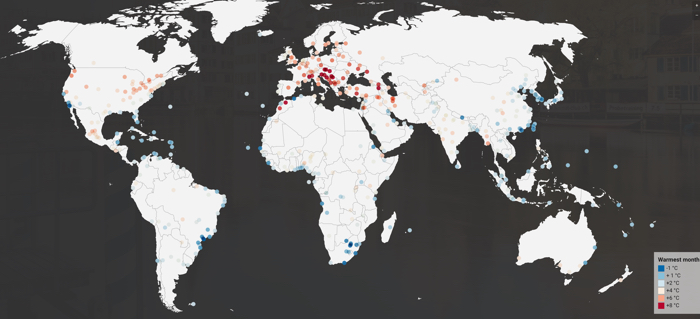The world is about to undergo a drastic transformation that will see cities around the globe inherit the disparate climates of places hundreds of miles away, new research shows.
By 2050, scientists say over three-quarters of the world's cities will have had their climate systems rearranged as part of this rapid metamorphosis. Most concerning of all, over 20 percent of cities will experience conditions that have no precedent in any city in the world today.
In truth, it's not the first time scientists have told us such an unthinkable overhaul of our weather patterns is imminent.
A study published just a few months ago suggested that by the year 2080, cities in North America will feel like they're about 500 miles (800 km) away from where they are today – for the most part, they'll be hotter and wetter, as if the whole country existed in the US south (if not Mexico).
But the new research takes the same approach a big step further.
Scientists from the Crowther Lab at ETH Zurich have for the first time visualised how these climate shifts will play out on a global scale, looking at how conditions in 520 major cities around the world are predicted to change in just three decades.
 Cities of the world and predicted climatic shifts. (Crowther Lab)
Cities of the world and predicted climatic shifts. (Crowther Lab)
Underpinning their visualisations, the researchers used existing data based on the UN Intergovernmental Panel on Climate Change's (IPCC) Representative Common Pathway 4.5 (RCP 4.5) pathway – generally considered an optimistic best-case-scenario in which CO2 emissions peak in the middle of this century.
"It is a stabilisation scenario, meaning that it accounts for a stabilisation of radiative forcing before 2100, anticipating the development of new technologies and strategies for reducing greenhouse gas emissions," the authors explain in their paper.
"By using this optimistic climate change scenario, we represent conservative changes in climate conditions that are likely to occur even if substantial climate change mitigation occurs."
Even in this optimistic model, though, the climate changes underway – and the 'city analogues' each city is about to resemble – are breath-taking.
By 2050, in terms of climate, the team says London will be like the Barcelona of today. Seattle will resemble San Francisco. Stockholm will feel like Budapest.
Paris will be the new Canberra. Reykjavik in Iceland will be like Wellington in New Zealand.
BREAKING: A fifth of cities worldwide 🌏 will face dramatic and unprecedented urban climate conditions by 2050. @CrowtherLab's new global data map visualizes #ClimateChange impact on cities 🗼🗽 🌉 to drive urgent action → https://t.co/IZ5HGUh0qn #2050Cities pic.twitter.com/dXaTXsocKp
— Crowther Lab (@CrowtherLab) July 10, 2019
Evidently, most of these changes mean things will get significantly hotter and wetter, particularly in the Northern Hemisphere, as the world makes a general shift towards more subtropical conditions.
"For example, across Europe, both summers and winters will get warmer, with average increases of 3.5°C and 4.7°C, respectively," the team explains.
"These changes would be equivalent to a city shifting ~1,000 km further south towards the subtropics."
You can see where your own city is destined in an interactive tool here.
According to the researchers, 77 percent of the 520 cities studied will experience a "striking change in climate conditions" like this by 2050, which will make them resemble the current conditions of their 'city analogues'.
But not every city's fate has a counterpart today. The analysis shows that 22 percent of the world's current cities are likely in the future to exist in unprecedented climatic regimes that do not even exist on Earth today.
"These are environmental conditions that are not experienced anywhere on the planet at the moment," lead researcher and ecologist Tom Crowther told The Guardian.
"That means there will be new political challenges, new infrastructure challenges, that we have not faced before… We are absolutely not prepared for this."
It's dire stuff. It almost doesn't bear thinking about – but think about it we must.
The whole point of the study, the researchers say, is to bridge the 'consensus gap': the disconnect between the scientific and public understanding of climate change.
One way of doing that is to get people to try to understand what's happening to the planet in this climate crisis, by making the changes more relatable to their experience of the world.
Then, with that understanding of what we're really facing, the hope is that meaningful action to combat these dangerous changes may finally crystallise.
"History has repeatedly shown us that data and facts alone do not inspire humans to change their beliefs or act," the scientists write.
"A growing body of research demonstrates that visualisation - the ability to create a mental image of the problem - is the most effective approach for motivating behaviour change."
The findings are reported in PLOS One.
